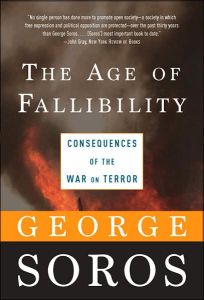Acesse a sua conta getAbstract para obter o resumo!

Acesse a sua conta getAbstract para obter o resumo!
George Soros
The Age of Fallibility
Consequences of the War on Terror
Public Affairs, 2007
Sobre o que é?
Is it too late for America to reclaim its place as a guiding light for the rest of the free world?
Recommendation
Self-made billionaire George Soros offers a dense, philosophical and theoretical book about the state of the United States and the world. Whether you like Soros’ politics or not, he speaks as a caring, major figure in investments, politics and philanthropy, where his strategies are well conceived and academically founded. This book covers the theoretical foundations of his political philosophy, and his concerns about democracy and open societies. He describes his vision for a better world, and talks about what his foundations are doing to fulfill that vision. Soros also talks very personally about his family background, his experiences with persecution and his struggle to reach the top, having arrived in London as a penniless refugee. He also explains how he recognized the investment opportunities that made him a billionaire. This highly unusual political and economic treatise is a glimpse inside an extraordinary contrarian mind. Agree with him or not, getAbstract thinks you will find that Soros is interesting company. (As is true of every Abstract, the following views are those of the author and not of getAbstract.)
Summary
About the Author
Billionaire investor George Soros founded a global network of foundations dedicated to supporting open societies. He has written several books, including The Bubble of American Supremacy, Underwriting Democracy and Open Society.























Comment on this summary